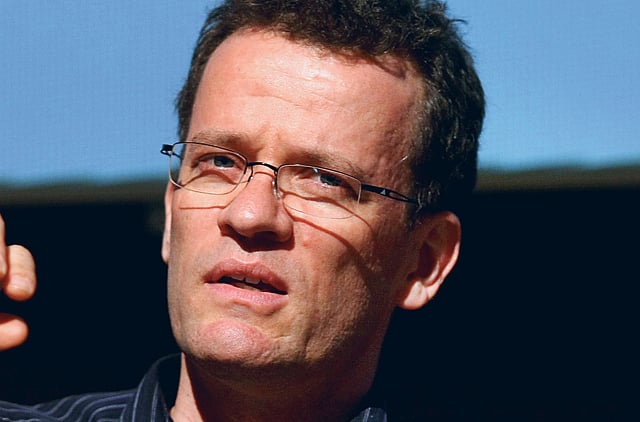The need to connect
Yann Martel feels it is vital to travel to remove prejudices

Yann Martel, author of the wonderful, engrossing and mystical book, Life of Pi, spoke to Weekend Review by phone on subjects as diverse as e-readers and religion, from his home in Saskatchewan, Canada, before arriving in Dubai for the Emirates Festival of Literature.
Excerpts:
"No priest, no pundit, no imam would want his followers to practise all three religions," quotes the author from his novel when asked whether he was calling for cultural harmony.
The writer, who spent two and a half years in India researching the book, says Pi allowed him to look at faith and connect the three main religions in India. It is, in a way, a call for tolerance, he says. "Islam is one of the few religions that recognises other religions. It recognises the prophets of Judaism and Christianity. It did not impose conversion like Christianity did," he says.
Removing mistrust
He says while there is a level of suspicion between the West and Muslims, his encounter with Muslims during his travels has been pleasant. Martel says he cannot think of what Muslims can do to remove that mistrust, but notes the lot of women can be improved in some Arab countries. "There is a level of bias," he says about Arab women and the veil. (Iranian women, he feels, are quite empowered).
The writer feels the mistrust between the West and Muslims can be removed by travelling. Dubai, he says, is helping in a way as a lot of Westerners work and live here or transit through the emirate.
Martel says he has earlier transited through Dubai and Abu Dhabi. "It is interesting to see an Arab country take such a bold step," he says, speaking about Dubai. Unlike other Arab countries that have natural resources, Dubai has none but has taken steps to be part of the marketplace, in a different way, he says.
The author says while the West has become more secular and religion has become more of a personal thing and not a social force anymore, there are good and bad aspects of secularism.
"I have no problem throwing out old hierarchies, dogmatic religions," he says, but notes that "there is more to life than just chemistry and chance".
The novelist feels there could be some sort of a plan out there. "Not entertaining notions of the Divine diminishes life," he says. But he feels that religion thrives with people who are free to discuss and debate. "If you love something, you have to love it freely."
Giving an insight into his writing and thought process, the author says he gave up writing by longhand.
"The computer is an incredibly powerful tool," he says. "All I need is a little desk and a bit of quiet. There is no fixed routine. I can write all day long. I can work on one paragraph all day."
"India brought me Pi. A review of a Brazilian novel gave me a key idea. Ideas keep popping in your head," the writer says when asked to share his secrets. He reads a lot for research and then it is inspiration and hard work.
Speaking about his new book Beatrice and Virgil, he says, as a citizen you know what to do politically about genocide — there is a rule of law, respect for minorities. Martel says the enormous massacre of innocents was always at the back of his mind and as an artist, he has tried to bring the lessons of the Holocaust to the story and tried to apply that lesson today.
Speaking about how he feels when a book is finally published, he says Beatrice and Virgil was a long one to write and a hard one to pull off. "It is both a relief and a pleasure. It won't do as well (as Pi. Its success was unbelievable). Books are a dialogue (with readers). I can't wait to hear what people have to say about it."
Beatrice and Virgil is about a writer who meets a taxidermist who is an aspiring playwright and the story is about humanity, who we are and what we are capable of doing to survive. "It took me years to think it straight," he says.
The author, who is a Man Booker Prize winner, says e-books save a lot of trees. It is just another way of reading. "Every generation laments the loss of something, there is a lot of nostalgia" he says. "Some say that e-books are cold."
The book, he says, is a complicated thing to produce but you can travel better with e-books and have 40 books without being weighed down.
The writer feels that in the future there will be a mixture of both printed books and e-books and electronic books will be for lighter reading as poetry or magazines. E-readers will spread knowledge and literature, he says. "Anybody, anywhere, can get a book, as long as they are connected (to the web). When cars came out, people said they preferred horses. Some still like to ride a horse. You can have both. With e-books, there is a dictionary; a voice reads out to you. There is so much secondary knowledge."
Sign up for the Daily Briefing
Get the latest news and updates straight to your inbox
Network Links
GN StoreDownload our app
© Al Nisr Publishing LLC 2026. All rights reserved.